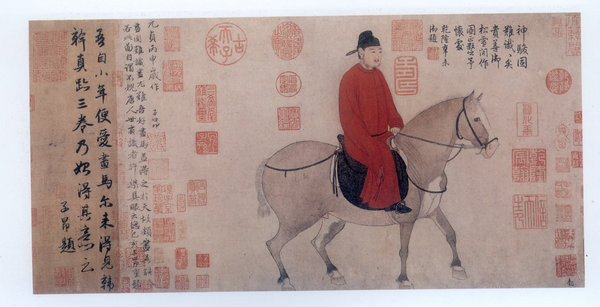Zhao Xu and Su Qiang
( China Daily ) Updated: 2015-12-19 11:45:47
 |
|
A work by Zhao Mengfu (1254-1322), a representative of literati painting.[Photo provided to China Daily] |
Imitation may be the sincerest form of flattery, but when that consists of stealing the very creativity that puts food on an artist's table, it is inevitable that he or she is going to devise a way to stop it happening.
In Chinese art this has included artists using almost impossible-to-replicate brushstrokes and stamping their work with seals apparent only to the painter.
The painter Qian Xuan (1239-1299) was a prodigious user of personal hallmarks. Qian, who lived in a time of dynastic change, admitted to having signed works with "a byname never used before", in order to "stop and shame my imitators". What makes this particularly remarkable is that Qian, also a much-celebrated poet and essayist, had long championed the view that true artists should not be influenced in their creative work intent to pander, and that their works certainly should not be traded for money.
It is a familiar proposition in Chinese art history, one that lay at the heart of what was known as literati painting.
"As the name suggests, literati paintings were done by people who were reared on the country's literary tradition," says Zhang Zhen, an expert in ancient Chinese painting and calligraphy with the Palace Museum in Beijing.
"And since they belonged to the sophisticated social elite and were presumably well-off, they didn't have to sell their works to live. They painted not for a clientele, but for themselves, and for them painting was more a form of entertainment and introspection than a means of living."
For these artists, painting was, in a word, cathartic. The still waters under their brushes served up reflections of themselves as cultured, sensitive men. (And yes, they were, to a man, men). Some saw their professional counterparts, who were often born into poor families and received little education apart from how to paint, as worth less than themselves.
|
|
|
|
|
|
|
|
